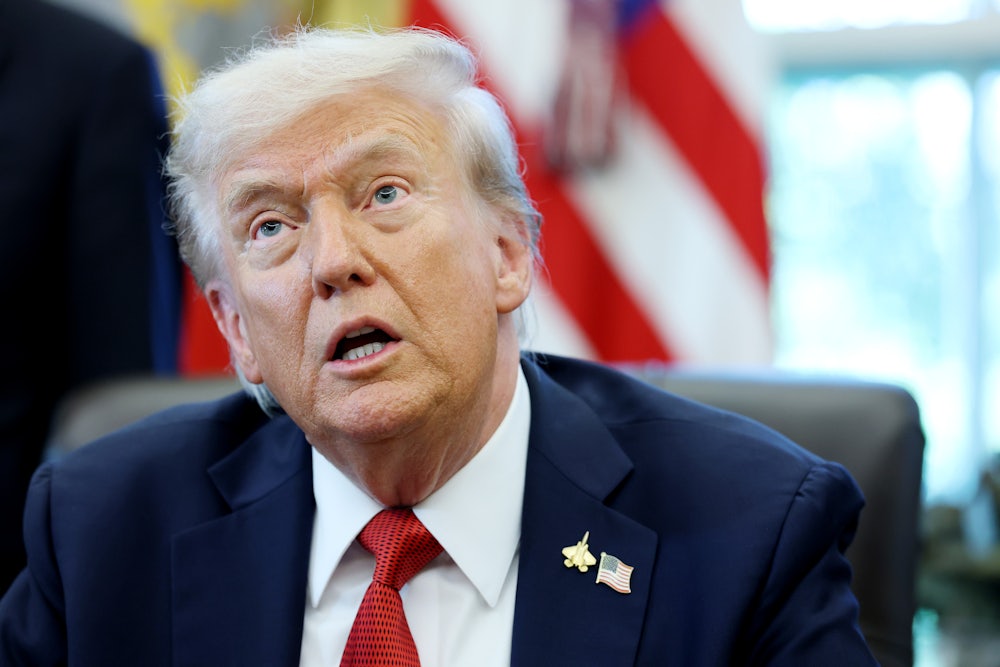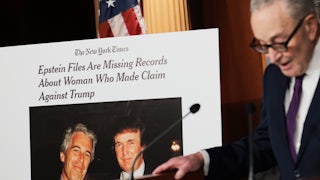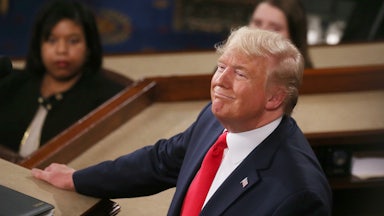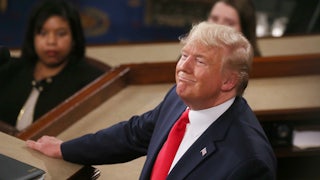Russell Vought has been “dreaming” of a government shutdown “since puberty”—at least according to Utah Senator Mike Lee, who boasted about the head of the Office of Management and Budget’s mastery of the dark arts shortly after the shutdown began a week ago. “This is going to empower [President] Trump—and the American people,” Lee concluded.
That’s been the Republicans’ shutdown message for some time: raising the specter of Vought as a thinly veiled threat to Democrats. Practically since Vought was confirmed as OMB director in February, Republicans have suggested that he would use a shutdown to inflict maximum damage to the administrative state. Last week, as anxiety was spiking about what increasingly looks like a lengthy shutdown, President Trump posted an AI video of Vought as the Grim Reaper. The Project 2025 architect has lived up to the billing, cutting billions in federal funding to blue states, threatening to cull entire agencies, and even mulling—in clear violation of federal law—not giving shutdown workers back pay.
Trump and Vought have clearly come to two conclusions. The first is that they have the upper hand in negotiations to reopen the government. As federal workers sit at home or work without pay and government services further deteriorate, the Democrats will be forced to cave—accepting a deal to fund the government that doesn’t extend the enhanced Obamacare subsidies. The second is that it’s a win-win. They want to gut the government anyway; if the shutdown drags on for weeks or even months, so be it. But the administration is already overplaying its hand, and moreover it’s repeating mistakes that it made just a few months ago when it gave free rein to a different nihilist—Elon Musk—to take a hammer to the government.
Trump lives in a bubble where everything he does is rapturously received and any criticism or pushback is inherently illegitimate. So the president and his White House minions probably don’t believe—or don’t care—that the public blames the GOP more than Democrats for the shutdown. A second-term administration has that luxury, but other Republicans are not so fortunate. There are suggestions that Republicans in the Senate—where the shutdown is currently stuck—are particularly frustrated.
The administration was roundly criticized Tuesday for an OMB draft memo arguing that, contra a law passed after the 2019 shutdown, federal workers are not guaranteed back pay. Susan Collins, a moderate who has been instrumental in negotiations to reopen the government, said that Congress had “settled” the issue when it passed a law guaranteeing back pay in 2019; John Thune, the chamber’s Republican leader, pretty much concurred. Thom Tillis, another key Republican vote, was blunt: “I’m not an attorney,” he said, “but I think it’s pretty bad strategy to even say that sort of stuff.” Later on Tuesday, as is his wont, Trump hung his Senate peers out to dry by precisely saying that sort of stuff. “I would say it depends on who we’re talking about,” Trump said when asked about back pay for furloughed workers. “For the most part, we’re going to take care of our people. There are some people that really don’t deserve to be taken care of, and we’ll take care of them in a different way.”
It isn’t just open threats like this that invite public ire; Trump’s and Vought’s actions are unpopular too. The decision to use the shutdown as an opportunity to cut federal jobs and spending is likely playing a crucial role in the public perception that this shutdown is the GOP’s fault, even if it was technically started because Democrats didn’t vote for a funding bill. It’s hard to suggest that the administration wants or is even trying to reopen the government when it is also gleefully boasting about its hatchet man running around firing people.
Even if the shutdown doesn’t have long-term political ramifications—it will likely be forgotten by the 2026 midterms—Vought’s actions may play decisive roles in 2025 races, such as close gubernatorial contests in Virginia and New Jersey. The threat to deny back pay to federal workers (and the shutdown more broadly) will hit particularly hard in Virginia, a state with a disproportionately high number of federal workers thanks to its proximity to Washington, D.C. Vought also suspended billions in funding for the Gateway Tunnel, which would connect Newark, New Jersey, and New York City—a project that is very popular with commuters.
The Trump-Vought shutdown is already affecting everyday life across America. More than 620,000 federal workers have been furloughed, a number that will rise considerably as agencies run out of carryover funds. Services at national parks are being cut, and some locations are being forced to close. There have also been significant disruptions in air travel: Hollywood Burbank Airport was without air traffic controllers for part of Monday, and there were significant flight delays at major airports across the country on Tuesday.
This is a lot like what happened a few months ago, when Musk’s Department of Government Efficiency was moving fast and breaking things in the federal bureaucracy—and one of those things was airline safety. Funding cuts and an associated exodus of air traffic controllers led to widespread shortages in the spring and may have contributed to disasters, accidents, and near misses. Within three months of DOGE’s launch, nearly 60 percent of the public disapproved of its actions—particularly its rapid pace—a number that is even more devastating considering that the effort was broadly popular when it was launched in January.
One person in the administration was especially peeved about DOGE. Last month, in a profile on Vought, The New York Times reported that he “could barely contain his frustration” with DOGE for “unilaterally axing items” that he had “intended to keep.” Reportedly, “during one flash of irritation,” Vought told staff, “We’re going to let DOGE break things, and we’ll pick up the pieces later.”
And yet, that is exactly what Vought is now doing. It must feel like déjà vu for some Republican senators. Thune, who back in March had urged Musk to hand off DOGE’s work to the Senate-confirmed “leaders” in Trump’s Cabinet, now appears equally frustrated with the Cabinet member to whom this work has been handed off. “We don’t control what he’s going to do,” he said. “This is the risk of shutting down the government and handing the keys to Russ Vought.”
Vought is, to be clear, nowhere near the buffoon that Musk is. But it’s undeniable that people like the idea of federal spending cuts more than they do the reality of them. It also seems clear that Musk’s constant need to draw attention to himself meant that he—not Trump or his administration—took much of the blame for DOGE’s bumbling sociopathy. DOGE was seen by a slice of the public as its own thing, as many voters gave it a thumbs-down while still broadly approving of the Trump presidency.
But Trump has little to insulate him now. Vought is not some temporary White House employee who’s dabbling in the art of sabotaging the government before he returns to his “job” as the world’s richest man. He is Trump’s personal hatchet man and, according to the president himself, the Grim Reaper personified. Decking the dorky, bespectacled Vought in a hooded robe and handing him a scythe may seem amusing to Republicans in the early days of the shutdown, but as the cuts get deeper, the mood will quickly turn sour.






